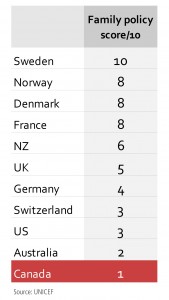There is a growing intergenerational breach in Canada. Consider three facts.
- Average household income for Canadian couples approaching retirement (Baby Boomers) increased 18% since the mid-1970s. This increase is nearly four times greater than the increase reported for couples age 25-34 over the same period.
- In 1976, the low-income rate among seniors in Canada was 29%. As of 2009, it is 5%. By contrast, the low-income rate for families with children is 10% — twice as high.
- Boomers approach retirement with far greater private wealth than previous generations because they lucked out in a housing market that increased 76% over their adult lives. With this additional wealth in housing, Boomers now transform expectations for retirement, making globetrotting and second homes more and more the norm.
 All the while, skyrocketing housing prices are the primary source of private debt for the generations that follow – the very people who must sustain the economy to pay for the pensions and medical care required by an aging population, and the very people who must invest in Canada’s future – their children, and Boomers’ grandchildren.
All the while, skyrocketing housing prices are the primary source of private debt for the generations that follow – the very people who must sustain the economy to pay for the pensions and medical care required by an aging population, and the very people who must invest in Canada’s future – their children, and Boomers’ grandchildren.
While Boomers approach retirement with more private income and wealth than previous generations of retirees, they leave far larger public debts than they inherited.
Although our economy doubled in size since 1976, our national debt nearly tripled.
There is also Canada’s environmental debt. It remains among the very highest in the industrialized world, as measured by Carbon Dioxide emissions per person. While we have made no progress reducing these emissions per person since 1976, many other countries have since decreased their environmental footprint significantly.
Growing public debts amid greater private wealth for those approaching retirement invites questions about an intergenerational tension. Do Boomers care that other generations don’t share the standard of living they now enjoy?
There is absolutely no doubt that Boomers care. But the last federal election paints a worrisome picture. Political leaders of all major Parties prioritized:
× Status quo increases to medical care spending, which generally overlook health promotion when citizens are younger.
× Strengthening pensions and reducing seniors’ poverty, even though poverty among seniors is already less than half of the poverty rate for families with young children.
This last election shows that Boomers play politics well, and Boomer leaders responded accordingly.
By contrast, the generation raising young kids does not participate politically nearly as well, and they get a bad deal as a result.
We know they get a bad deal because national and international data show that Canadians have been slow to adapt public policy in response to the time, income and service squeeze with which the generation raising young kids struggles.  This is the case in all provinces, with some exceptions in Quebec.
This is the case in all provinces, with some exceptions in Quebec.
Canadian policy expects parents to endure a major reduction in household income to care for a baby at home
A typical Canadian couple outside of Quebec will forgo $13,000-$15,000 in after-tax income when parents share a year to be home with a newborn age 3-15 months, even after collecting parental leave benefits. In Sweden and Germany, policy ensures the same couple does not lose any after-tax income.
Canadian policy provides parents with very limited access to quality child care services
Despite the need for parents to have sufficient time in the labour market to manage stalled incomes and rising housing costs, and despite evidence showing the importance of quality environments for child development, Canada allocates just 0.34% of GDP to child care and kindergarten services for children under age six (2008). This is just over half of the UK and New Zealand; and barely one-third of what is allocated in France, Sweden and Denmark.
Canadian workplace standards mean employees have less time at home
Although Canadians say we value the role of parenting, Canadian workplace standards mean the typical Canadian employee works 300 hours per year (over 8 weeks) more than the typical Dutch, Norwegian and German employee. While higher housing prices make this commitment to the labour market understandable, it erodes the opportunity to be home with kids.
Canadian policy tolerates high rates of child poverty
Canada ranks among the industrialized countries with the highest rates of child poverty. Child poverty in Canada is three to five times higher than the countries that make it a real priority to eliminate poverty among the generation raising young kids.
These poor policy realities beg an important question: What kind of Canada do we want? One that ignores the intergenerational breach? Or a Canada that recommits to working for all generations?

